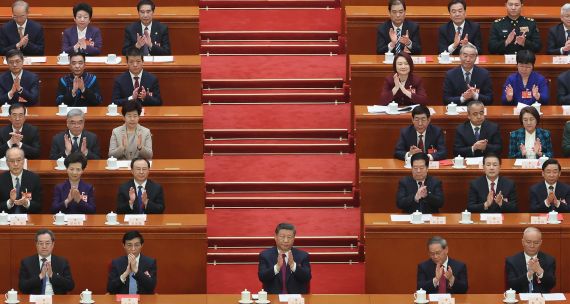Reflecting on Chinese President Xi Jinping’s virtual address to the World Economic Forum, two thematic points stand out as having particular relevance to discussions of Canadian foreign policy toward China and the Asian region.
The first was Xi’s appeal to the international community to avoid a return to a Cold War-era, spheres-of-influence structure within international society based on ideological and political differences. President Xi, instead, argued for a more inclusive approach to state relations, one that treats different political systems as a feature, not a bug, of the global system. He urged international leaders to embrace divergent political institutions as a type of multilateralism, arguing that the true measure of a system’s legitimacy is whether it accurately reflects the country’s historic, cultural, and social conditions and whether it achieves a higher standard of living for the society it represents.
Xi went on to warn against ideational arrogance, or the idea that any one system of governance is inherently superior to another. Instead, he argued, states should be judged by the level of support they receive from their societies, as the state’s inherent purpose is to provide social goods, not to represent a specific ideology.
While Western commentators were quick to dismiss this aspect of Xi’s speech as nothing more than propaganda from the Chinese Communist Party (CPP), their failure to take Xi’s words seriously ironically strengthens his overall point. Far from an ‘oppressive’ system as Western leaders such as former U.S. Secretary of State Mike Pompeo have suggested (on multiple occasions), in China, the CCP enjoys enormous support among its people.
Indeed, one widely cited, highly rigorous Harvard University poll on Chinese perceptions toward Chinese leadership has measured growing support among Chinese toward the CCP, with more than 95 per cent of respondents suggesting a high degree of satisfaction with the Party. Further, numerous Chinese and non-Chinese polls show a high level of Chinese public satisfaction toward the CCP’s pandemic response and recovery efforts. Add to this the CCP’s very visible role in poverty reduction and anti-corruption campaigns across China and, although Canadians may find the idea uncomfortable, it is possible to understand Xi’s point that states should be judged by their efficiency, not their ideology.
While Canadian policy-makers are right to hold the CCP accountable for its repressive policies in Xinjiang, Tibet, and Hong Kong, the suggestion by political commentators in Canada that the CCP does not represent the ‘real’ China complicates Ottawa’s strategic approach to Beijing. Rather than suggesting that the CCP is the ‘problem,’ or that Canada should bypass the Party and reach out directly to the Chinese people, Ottawa should rather develop a policy approach for dealing with the Party as it actually is, not as the commentators wish it to be. Specifically, Canada should focus on pragmatic engagement with the CCP designed to address common strategic challenges while broaching more sensitive issues such human rights through back channels. An approach of this type would ensure stability in the two states’ bilateral relations while also enabling Canada to continue dialogue with China on normative issues where the two states disagree.
The Biden administration’s nascent approach to China offers a useful blueprint in this respect. Rather than treat open hostility toward the CCP as the litmus test for a ‘tough’ China policy – as was the Trump administration’s approach – the Biden administration has made clear it will seek co-operation with the Party on strategic issues where doing so makes sense for American interests. This does not mean the U.S. will avoid raising its concerns toward China on human rights matters, for example, but rather that it will do so in isolation to its larger strategic approach.
This leads to the second salient point in Xi’s Davos speech with relevance to Canada’s foreign policy, which was his advocacy for multilateralism to tackle the intricate and complex global challenges all states face, including the pandemic, climate change, and endemic poverty. Here Xi identified the value of different systems, approaches, and the ideas they produce as a strength within the international system, not a weakness. Xi also identified China’s position as a leader across the developing world and pledged direct support for pandemic relief and poverty reduction, within China’s capacity. This may be controversial but a fact that the West needs to understand, and to which it must adapt.
Here, too, Canadian policy-makers would be wise to take Xi’s comments at face value. China will undoubtedly be a global leader in the coming months and years around global vaccination programs, sustainable development, and green growth in the Global South. Canada will be better situated to accomplish its foreign policy and development goals in Asia – where China is arguably the most significant economic and political actor – if it has a working partnership with Beijing.
None of this requires Canadian leadership or the Canadian public to accept China’s political values as their own or to stop pressing China on issues of importance to Canada. Ottawa must continue to unequivocally push for Beijing to immediately release Michael Kovrig and Michael Spavor at every possibility and, indeed, make an overall improvement in the two states’ relations conditional on this point.
Yet, Xi’s speech makes it clear that China is messaging its intent to act as a responsible stakeholder in the international community where it finds other states willing to engage with it without resorting to ideological attack. Canada can best hold China to account in this regard through co-operation and dialogue, even while articulating its own foreign policy and governance values.
An edited version of this commentary piece first appeared in the South China Morning Post on February 1, 2021.





